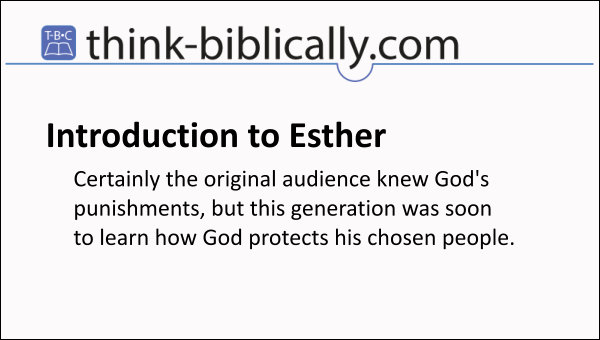By Tyson Thorne

Certainly the original audience knew God's punishments, but this generation was soon to learn how God protects his chosen people. The story of Esther takes place during the time-frame of Ezra and Nehemiah, and specifically would have happened between Ezra chapters eight and nine. While God himself is not written into the story, nor any mention of prayer, or worship, his activities behind the scenes as Esther and Mordicai faithfully follow what they believe is God's leading is clear for all to see. This is evidenced by the celebration on Purim, which is still practiced to this day.
The major characters in this story are Esther, Mordecai and Haman. The first two are completely unremarkable characters. They are simply living life, the way so many people have through the ages to this day. Their opponent, on the other hand, was a member of the Persian Empires high court. He had a family, as selfish and wicked as himself, helping him plot and rise to power. He was a formidable man, willing to commit genocide because one man wouldn't show him the honor he thought he deserved.
Had Esther not followed the calling of her faith, Haman would have won. Had Haman's plot to exterminate the Jews succeeded it would have been an end to the Abrahamic Covenant and, perhaps more disconcerting, the line through which the Messiah was foretold to come from. God's people and all his promises were on the line. The story's happy (if gruesome) ending is due to the courage and obedience of a girl, a commoner, no one of notice.
Every follower of God is intended to remember Esther — one never knows what God is planning, or how he intends to use us if only we will follow and obey.
Author and Date of Writing
Officially the author of the book of Esther is unknown, tradition holds, however, that the author is Mordecai. If it wasn't Esther's uncle, then it was someone who was an eye-witness to the events. There are just too many references to Persian customs and too much detailed information about the palace for it to be anyone else. Going on the eye-witness theory, it puts the date of writing about 475 BC.
Big Idea
God's providential protection extends to those who bless the people of Israel and, in this case, literally curses those who curse Israel.
Outline
The book is easily divided by feasts.
I. Feasts of Xerxes, 1.1-2.18
II. Feasts of Esther, 2.19-7.10
III. Feast of Purim, 8-10
